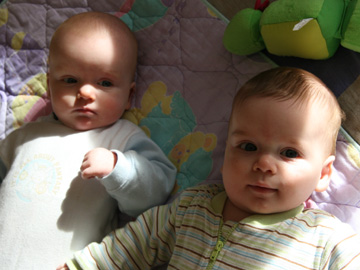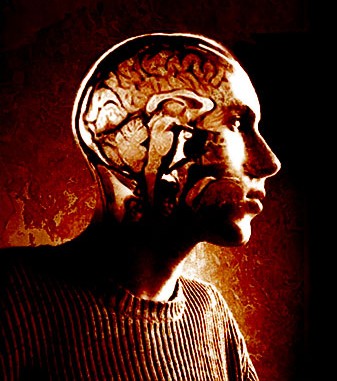|
Surgency
Surgency is a trait aspect of emotional reactivity in which a person tends towards high levels of positive affect. The APA Dictionary of Psychology defines it as "a personality trait marked by cheerfulness, responsiveness, spontaneity, and sociability but at a level below that of extraversion or mania." In children, surgency is an emotional dimension that is characterized by high levels of activity and positive emotion, impulsivity, and engagement with their environment. It has been linked to the Big Five personality trait of extraversion in children. High surgency in children as identified by parental self-report has been associated with lower levels of effortful control. A 2003 meta-analysis of gender differences in temperament showed a small to moderate gender difference in surgency levels between boys and girls, with boys showing higher levels of surgency and "generally indicating that boys are slightly more active, less shy, and derive more pleasure than girls from high-intens ... [...More Info...] [...Related Items...] OR: [Wikipedia] [Google] [Baidu] |
Positive Affectivity
Positive affectivity (PA) is a human characteristic that describes how much people experience positive affects (sensations, emotions, sentiments); and as a consequence how they interact with others and with their surroundings. People with high positive affectivity are typically enthusiastic, energetic, confident, active, and alert. Research has linked positive affectivity with an increase in longevity, better sleep, and a decrease in stress hormones. People with a high positive affectivity have healthier coping styles, more positive self-qualities, and are more goal oriented. Positive affectivity also promotes an open-minded attitude, sociability, and helpfulness. Those having low levels of positive affectivity (and high levels of ''negative'' affectivity) are characterized by sadness, lethargy, distress, and un-pleasurable engagement (see negative affectivity). Low levels of positive affect are correlated with social anxiety and depression, due to decreased levels of dopamine. ... [...More Info...] [...Related Items...] OR: [Wikipedia] [Google] [Baidu] |
Trait Theory
In psychology, trait theory (also called dispositional theory) is an approach to the study of human personality. Trait theorists are primarily interested in the measurement of ''traits'', which can be defined as habitual patterns of behaviour, thought, and emotion. According to this perspective, traits are aspects of personality that are relatively stable over time, differ across individuals (e.g. some people are outgoing whereas others are not), are relatively consistent over situations, and influence behaviour. Traits are in contrast to states, which are more transitory dispositions. In some theories and systems, traits are something a person either has or does not have, but in many others traits are dimensions such as extraversion vs. introversion, with each person rating somewhere along this spectrum. There are two approaches to define traits: as internal causal properties or as purely descriptive summaries. The internal causal definition states that traits influence our behav ... [...More Info...] [...Related Items...] OR: [Wikipedia] [Google] [Baidu] |
Emotion
Emotions are mental states brought on by neurophysiological changes, variously associated with thoughts, feelings, behavioral responses, and a degree of pleasure or displeasure. There is currently no scientific consensus on a definition. Emotions are often intertwined with mood, temperament, personality, disposition, or creativity. Research on emotion has increased over the past two decades with many fields contributing including psychology, medicine, history, sociology of emotions, and computer science. The numerous theories that attempt to explain the origin, function and other aspects of emotions have fostered more intense research on this topic. Current areas of research in the concept of emotion include the development of materials that stimulate and elicit emotion. In addition, PET scans and fMRI scans help study the affective picture processes in the brain. From a mechanistic perspective, emotions can be defined as "a positive or negative experience that is as ... [...More Info...] [...Related Items...] OR: [Wikipedia] [Google] [Baidu] |
Affect (psychology)
Affect, in psychology, refers to the underlying experience of feeling, emotion or mood. History The modern conception of affect developed in the 19th century with Wilhelm Wundt. The word comes from the German ''Gefühl'', meaning "feeling." A number of experiments have been conducted in the study of social and psychological affective preferences (i.e., what people like or dislike). Specific research has been done on preferences, attitudes, impression formation, and decision-making. This research contrasts findings with recognition memory (old-new judgments), allowing researchers to demonstrate reliable distinctions between the two. Affect-based judgments and cognitive processes have been examined with noted differences indicated, and some argue affect and cognition are under the control of separate and partially independent systems that can influence each other in a variety of ways (Zajonc, 1980). Both affect and cognition may constitute independent sources of effects within ... [...More Info...] [...Related Items...] OR: [Wikipedia] [Google] [Baidu] |
Extraversion And Introversion
The traits of extraversion (also spelled extroversion Retrieved 2018-02-21.) and introversion are a central dimension in some human personality theories. The terms ''introversion'' and ''extraversion'' were introduced into psychology by Carl Jung,Jung, C. G. (1921) ''Psychologische Typen'', Rascher Verlag, Zurich – translation H.G. Baynes, 1923. although both the popular understanding and current psychological usage vary. Extraversion tends to be manifested in outgoing, talkative, energetic behavior, whereas introversion is manifested in more reflective and reserved behavior. Jung defined introversion as an "attitude-type characterised by orientation in life through subjective psychic contents", and extraversion as "an attitude-type characterised by concentration of interest on the external object". Extraversion and introversion are typically viewed as a single continuum, so to be higher in one necessitates being lower in the other. Jung provides a different perspective ... [...More Info...] [...Related Items...] OR: [Wikipedia] [Google] [Baidu] |
Mania
Mania, also known as manic syndrome, is a mental and behavioral disorder defined as a state of abnormally elevated arousal, affect, and energy level, or "a state of heightened overall activation with enhanced affective expression together with lability of affect." During a manic episode, an individual will experience rapidly changing emotions and moods, highly influenced by surrounding stimuli. Although mania is often conceived as a "mirror image" to depression, the heightened mood can be either euphoric or dysphoric. As the mania intensifies, irritability can be more pronounced and result in anxiety or anger. The symptoms of mania include elevated mood (either euphoric or irritable), flight of ideas and pressure of speech, increased energy, decreased need and desire for sleep, and hyperactivity. They are most plainly evident in fully developed hypomanic states. However, in full-blown mania, they undergo progressively severe exacerbations and become more and more obscured by ... [...More Info...] [...Related Items...] OR: [Wikipedia] [Google] [Baidu] |
Impulsivity
In psychology, impulsivity (or impulsiveness) is a tendency to act on a whim, displaying behavior characterized by little or no forethought, reflection, or consideration of the consequences. Impulsive actions are typically "poorly conceived, prematurely expressed, unduly risky, or inappropriate to the situation that often result in undesirable consequences," which imperil long-term goals and strategies for success. Impulsivity can be classified as a multifactorial construct. A functional variety of impulsivity has also been suggested, which involves action without much forethought in appropriate situations that can and does result in desirable consequences. "When such actions have positive outcomes, they tend not to be seen as signs of impulsivity, but as indicators of boldness, quickness, spontaneity, courageousness, or unconventionality" Thus, the construct of impulsivity includes at least two independent components: first, acting without an appropriate amount of deliberation, wh ... [...More Info...] [...Related Items...] OR: [Wikipedia] [Google] [Baidu] |
Big Five Personality Trait
The Big Five personality traits is a suggested taxonomy, or grouping, for personality traits, developed from the 1980s onward in psychological trait theory. Starting in the 1990s, the theory identified five factors by labels, for the US English speaking population, typically referred to as: * openness to experience (inventive/curious vs. consistent/cautious) *conscientiousness (efficient/organized vs. extravagant/careless) * extraversion (outgoing/energetic vs. solitary/reserved) * agreeableness (friendly/compassionate vs. critical/rational) * neuroticism (sensitive/nervous vs. resilient/confident) When factor analysis (a statistical technique) is applied to personality survey data, it reveals semantic associations: some words used to describe aspects of personality are often applied to the same person. For example, someone described as conscientious is more likely to be described as "always prepared" rather than "messy". These associations suggest five broad dimensions used i ... [...More Info...] [...Related Items...] OR: [Wikipedia] [Google] [Baidu] |
Raymond Cattell
Raymond Bernard Cattell (20 March 1905 – 2 February 1998) was a British-American psychologist, known for his psychometric research into intrapersonal psychological structure.Gillis, J. (2014). ''Psychology's Secret Genius: The Lives and Works of Raymond B. Cattell''. Amazon Kindle Edition. His work also explored the basic dimensions of personality and temperament, the range of cognitive abilities, the dynamic dimensions of motivation and emotion, the clinical dimensions of abnormal personality, patterns of group syntality and social behavior, applications of personality research to psychotherapy and learning theory,Cattell, R. B. (1987). ''Psychotherapy by Structured Learning Theory''. New York: Springer. predictors of creativity and achievement, and many multivariate research methodsCattell, R. B. (1966). (Ed.), ''Handbook of Multivariate Experimental Psychology''. Chicago, IL: Rand McNally. including the refinement of factor analytic methods for exploring and measuring these ... [...More Info...] [...Related Items...] OR: [Wikipedia] [Google] [Baidu] |
Personality Psychology
Personality psychology is a branch of psychology that examines personality and its variation among individuals. It aims to show how people are individually different due to psychological forces. Its areas of focus include: * construction of a coherent picture of the individual and their major psychological processes * investigation of individual psychological differences * investigation of human nature and psychological similarities between individuals "Personality" is a dynamic and organized set of characteristics possessed by an individual that uniquely influences their environment, cognition, emotions, motivations, and behaviors in various situations. The word ''personality'' originates from the Latin ''persona'', which means "mask". Personality also pertains to the pattern of thoughts, feelings, social adjustments, and behaviors persistently exhibited over time that strongly influences one's expectations, self-perceptions, values, and attitudes. Personality also predicts ... [...More Info...] [...Related Items...] OR: [Wikipedia] [Google] [Baidu] |
Negative Affectivity
Negative affectivity (NA), or negative affect, is a personality variable that involves the experience of negative emotions and poor self-concept. Negative affectivity subsumes a variety of negative emotions, including anger, contempt, disgust, guilt, fear, and nervousness. Low negative affectivity is characterized by frequent states of calmness and serenity, along with states of confidence, activeness, and great enthusiasm. Individuals differ in negative emotional reactivity.Tellegen, A. (1985). Structures of mood and personality and their relevance to assessing anxiety, with an emphasis on self-report. In A. H. Tuma & J. D. Maser (Eds.), Anxiety and the Anxiety disorders, (pp. 681-706), Hilssdale, NJ: Erlbaum. Trait negative affectivity roughly corresponds to the dominant personality factor of anxiety/neuroticism that is found within the Big Five personality traits as emotional stability. The Big Five are characterized as openness, conscientiousness, extraversion, agreeableness, a ... [...More Info...] [...Related Items...] OR: [Wikipedia] [Google] [Baidu] |
Postmodern Theory
Brian Duignan writes on the ''Encyclopædia Britannica'' that Postmodern philosophy is a philosophical movement that arose in the second half of the 20th century as a critical response to assumptions allegedly present in modernist philosophical ideas regarding culture, identity, history, or language that were developed during the 18th-century Enlightenment. Postmodernist thinkers developed concepts like difference, repetition, trace, and hyperreality to subvert " grand narratives", univocity of being, and epistemic certainty. Postmodern philosophy questions the importance of power relationships, personalization, and discourse in the "construction" of truth and world views. Many postmodernists appear to deny that an objective reality exists, and appear to deny that there are objective moral values. Jean-François Lyotard defined philosophical postmodernism in ''The Postmodern Condition'', writing "Simplifying to the extreme, I define postmodern as incredulity towards meta narrati ... [...More Info...] [...Related Items...] OR: [Wikipedia] [Google] [Baidu] |





